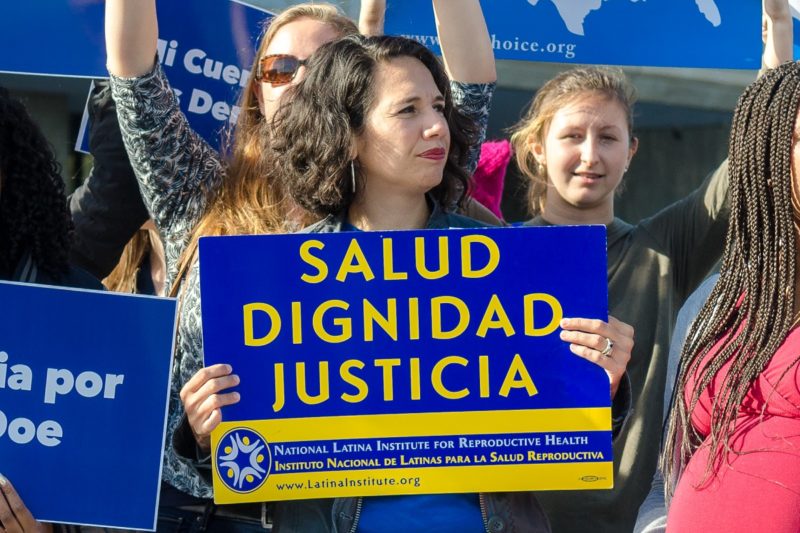Trump Administration Continues Blocking Immigrant Teens From Accessing Abortion Care (Updated)
Anti-choice Trump administration officials are again standing in the way of immigrant teens seeking abortion care.

UPDATE, December 19, 9:13 a.m.: A federal judge on Monday issued a temporary restraining order barring Trump administration officials from preventing the two teenage immigrants from seeking abortion care. The administration said it would allow one of the teens to receive abortion care, but requested a stay for the other teen, the Los Angeles Times reported.
After losing its fight to keep Jane Doe—a teenager whose abortion care was delayed because of court proceedings—from making her own reproductive health-care decisions, the federal Office of Refugee Resettlement (ORR) is once again attempting to block unaccompanied immigrant minors from accessing care.
Little is known about the two teenage girls, known as Jane Roe and Jane Poe, requesting access to abortion. Minors in ORR custody are often asylum-seeking young people from Central America. Many young women are escaping gender-based violence. Brigitte Amiri, senior staff attorney with the American Civil Liberties Union’s (ACLU) Reproductive Freedom Project, told Rewire in October that many of the girls and women in ORR’s care are pregnant as a result of being raped on their journey to the United States. Amiri said the stats for unaccompanied immigrant minors are similar to those of other migrant women. An estimated 80 percent of Central American women crossing Mexico en route to the United States are raped along the way, according to a 2014 report from Splinter.
Amiri was in court Monday, requesting an emergency order to prevent the Trump administration from denying the teenagers access to care based on a new ORR policy devised by anti-choice advocates.
The Trump administration in March implemented a revised policy “that allows [shelters] to wield an unconstitutional veto power over unaccompanied immigrant minors’ access to abortion,” according to court documents. This directive prevents unaccompanied immigrant minors in ORR’s care from obtaining abortion care by prohibiting federally funded shelters from taking “’any action that facilitates’ abortion access to unaccompanied minors in their care without ‘direction and approval’” from ORR Director Scott Lloyd. Advocates charge that Lloyd is a religious fanatic unqualified for his position as ORR director. He is considered by advocates to be an ideological pick by the Trump administration.
Lloyd has gone to great lengths to coerce immigrant teens to carry unwanted pregnancies, including using taxpayer funds to fly to shelters to “counsel” teens about their choices, despite admitting to having no counseling or medical experience. Lloyd has a well-documented history with so-called crisis pregnancy centers (CPCs), or fake clinics, which provide people with false information to dissuade them from seeking abortion care. These clinics compose almost all of the approved counseling centers listed by ORR for minors requesting abortion care. An investigation by Reveal found that this list came from the anti-abortion advocacy group Heartbeat International, whose mission is “to make abortion unwanted today and unthinkable for future generations.”
The Department of Health and Human Services’ (HHS) Administration for Children and Families, the agency that oversees ORR, is arguing that because Jane Roe and Jane Poe entered the United States without authorization, they can “voluntarily depart to their home country or find a suitable sponsor,” according to the Washington Post. If the girls choose not to return to their countries of origin or cannot find a suitable sponsor, “HHS does not believe [it’s] required to facilitate the abortion.”
The government made the same arguments in Jane Doe’s case. During an October hearing, Amiri said that if Jane Doe was an adult in an immigrant detention center overseen by Immigration and Customs Enforcement or was an undocumented adult in prison for committing a crime, her abortion care would not have been delayed. But because she was a minor in legal custody of ORR—and ORR maintains an interest in “fetal life and child birth”—the teen was forced to carry an unwanted pregnancy.
When asked by the court to clarify why Jane Doe could access abortion care as an undocumented adult in detention or prison but not as an undocumented minor detained in a shelter, the government’s counsel said the difference was that Jane Doe has the option of “voluntary departure.” Voluntary departure means that Jane Doe, who fled an abusive home in Central America where her teenage sister was beaten by her parents for being pregnant, could have self-deported to her country of origin, where abortion is illegal. The government argued that presenting voluntary departure to Jane Doe as her primary option did not constitute an undue burden.
Sponsorship is not easy to come by for immigrant girls seeking abortion care in ORR custody. Jane Doe has been in ORR custody for months and has had multiple sponsors denied by the agency. In November, Amiri told Rewire she doesn’t know the reason the teen is still in custody. A federal appeals court on October 20 gave the teen until October 31 to secure a sponsor so that she could access abortion care, and the federal government said it could find Jane Doe a sponsor by that date. But as of November 30, Jane Doe was still without a sponsor. This means that had Jane Doe’s attorneys not continued to fight for her to access care sooner than the October 31 deadline, she would have passed the 20-week mark and been forced to carry an unwanted pregnancy; ultimately, she was able to secure abortion care. Part of the reason Jane Doe may not have secured a sponsor is because the government is fighting for the ability to inform any potential sponsor that Jane Doe has accessed abortion care, a violation of her rights.
An ACLU spokesperson told Rewire they are anticipating a decision regarding the emergency order for Jane Roe and Jane Poe “within hours” of today’s 10:30 a.m. ET court hearing. The ACLU is expecting the federal government to “immediately appeal” the decision, with the possibility of the case quickly heading to the U.S. Supreme Court.
